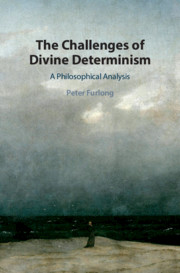Book contents
- The Challenges of Divine Determinism
- The Challenges of Divine Determinism
- Copyright page
- Dedication
- Contents
- Acknowledgments
- Introduction
- Chapter 1 A Primer on Divine Determinism
- Chapter 2 Divine Determinism and Free Will
- Chapter 3 Divine Determinism and Free Will
- Chapter 4 Divine Determinism and the Author of Sin Objection
- Chapter 5 Divine Determinism and the Blameworthiness Objection
- Chapter 6 Divine Determinism and the Free Will Defense
- Chapter 7 God, Determined Agents, and Love
- Chapter 8 Divine Commands, the Divine Will, and Divine Blame
- Conclusion
- References
- Index
Chapter 5 - Divine Determinism and the Blameworthiness Objection
Published online by Cambridge University Press: 07 June 2019
- The Challenges of Divine Determinism
- The Challenges of Divine Determinism
- Copyright page
- Dedication
- Contents
- Acknowledgments
- Introduction
- Chapter 1 A Primer on Divine Determinism
- Chapter 2 Divine Determinism and Free Will
- Chapter 3 Divine Determinism and Free Will
- Chapter 4 Divine Determinism and the Author of Sin Objection
- Chapter 5 Divine Determinism and the Blameworthiness Objection
- Chapter 6 Divine Determinism and the Free Will Defense
- Chapter 7 God, Determined Agents, and Love
- Chapter 8 Divine Commands, the Divine Will, and Divine Blame
- Conclusion
- References
- Index
Summary
One of the most difficult worries about divine determinism is that it makes God worthy of blame for all the evil in the history of the world. In this chapter, I explore this worry as an objection, which I call the blameworthiness objection, beginning with possible formulations depending upon universal moral principles, but finally settling upon a formulation taking the form of an analogical argument. I then turn to a thorough investigation of two possible replies, one based upon denying that God intends the evil of the world, the second relying on the claim that God has the moral authority to do anything to creatures. I then quickly consider five other replies to this objection, briefly outlining each and considering some possible costs that each one might impose. Finally, I outline a disjunctive reply to the original objection, which draws force from each possible reply without committing to any of them.
Keywords
- Type
- Chapter
- Information
- The Challenges of Divine DeterminismA Philosophical Analysis, pp. 105 - 133Publisher: Cambridge University PressPrint publication year: 2019

